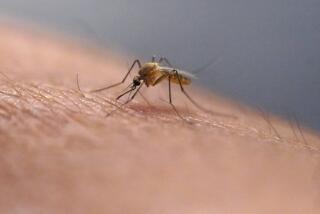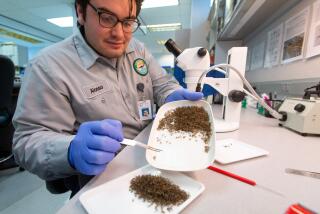Gorillas contract coronavirus at San Diego Zoo Safari Park
- Share via
Multiple gorillas at the San Diego Zoo Safari Park have contracted the coronavirus in the first known instances of natural transmission to great apes, the zoo announced Monday.
The zoo tested the gorillas’ fecal samples after two of them began coughing Wednesday, the zoo said in a news release. Preliminary results returned Friday showed the animals had tested positive, and U.S. Department of Agriculture laboratories confirmed the results Monday, the zoo said.
The tests confirmed the presence of the virus in only some of the gorillas but did not rule it out in others, the zoo said. Because gorillas live together, zoo officials are assuming that the entire troop has been exposed.
Three of the gorillas are currently showing signs of illness, including coughing, and are being monitored by veterinarians, who will treat each symptom as it arises, the zoo said. The entire troop is under observation.
“Aside from some congestion and coughing, the gorillas are doing well,” Lisa Peterson, executive director of the San Diego Zoo Safari Park, said in a statement. “The troop remains quarantined together and are eating and drinking. We are hopeful for a full recovery.”
We want to protect our loved ones from the coronavirus. For many of us, that includes our pets. Here’s what experts know about the risks they face.
Experts do not know how the virus will ultimately affect the gorillas or how their symptoms might progress. The zoo said it was consulting with health officials who had experience in treating the virus in case the gorillas became more gravely ill.
Peterson said that more than one gorilla had tested positive but would not provide an exact number.
The gorillas are believed to have caught the virus from an asymptomatic staff member even though the zoo follows the recommended safety protocols and its staff members wear personal protective equipment when they’re around wildlife, the zoo said. The zoo has been closed to the public since Dec. 6.
Peterson says the Safari Park plans to get stricter with its protocols. Staff who enter the gorilla enclosure will now wear a pair of disposable overalls over their work clothes. Keepers who already had to wear masks now must also wear eye protection.
The park first suspected the gorillas could have been exposed to the virus when a staff member tested positive for the coronavirus more than a week ago. Although the employee did not have COVID-19 symptoms, nearly half of the pandemic’s spread comes from asymptomatic infections, according to estimates from the Centers for Disease Prevention and Control.
That meant there was a chance the keeper could have infected the troop. Humans share about 98% of our DNA with gorillas.
The pandemic has been widespread in San Diego County for months, but this is the first time that any San Diego Zoo Global animals have tested positive for the coronavirus.
The Safari Park’s gorillas routinely get flu vaccines, and it’s possible that they will one day be vaccinated against COVID-19. But there’s no plan for that to happen anytime soon.
“I would never want to speculate on when that might be possible,” Peterson said. “We need to focus on the human side of this first and really get it under control in our communities.”
Coronavirus outbreaks have been reported at other zoos. In April, a tiger at the Bronx Zoo tested positive for the virus in what officials said at the time was the first known instance of person-to-animal infection. That was followed by the infection of several other tigers and lions. Last month, three snow leopards tested positive at the Louisville Zoo.
There have also been reports of other animals being infected with the virus, including minks, ferrets and pet dogs and cats.
Wosen writes for the San Diego Union-Tribune.
More to Read
Sign up for Essential California
The most important California stories and recommendations in your inbox every morning.
You may occasionally receive promotional content from the Los Angeles Times.











